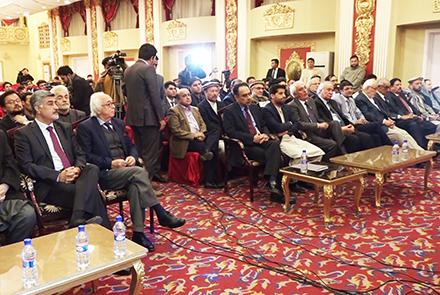Some prominent Afghan politicians and former government officials on Thursday criticized the Afghan government for its inability to achieve a breakthrough in the peace process, saying government has done nothing towards restoring peace in the country.
Referring to Friday’s summit in Moscow on peace in Afghanistan, politicians said that the international community had pledged to support only an Afghan-led and Afghan-owned peace process, but Moscow’s peace meeting is a clear violation of this commitment.
Among those who criticized the government’s peace policy was former minister of interior Mohammad Omar Daudzai, former national security advisor Rangeen Dadfar Spanta and chairman of the National Agenda Ahmad Wali Massoud.
“You (government) are trying to get points from the US under the name of peace process, but in real sense, you are manipulating the peace process to prolong your power,” said Ahmad Wali Massoud, chairman of Massoud Foundation.
“Afghan government must be given a role in the peace process, people also must have a role in the process,” said former minister of interior Mohammad Omar Daudzai.
“If one of our preconditions is related to the withdrawal of US forces, then there is a need for debates and discussions on it,” said former national security advisor Rangeen Dadfar Spanta.
Meanwhile, delegates at a meeting organized by Afghanistan Institute for Strategic Studies (AISS) expressed diverse views on the peace process in Afghanistan
They said that Pakistan sponsors the Taliabn.
The participants at this meeting said it is vital to start confidence-building measures between the warring factions to end the war.
This comes after The New National Front Party of Afghanistan on Tuesday announced that the party has split from the Grand National Coalition of Afghanistan (GNCA) alliance due to disagreements over certain issues.
These latest developments come as politicians, political parties and coalitions feverishly work to decide on their presidential candidate nominations for next year’s presidential elections.
According to the New National Front Party’s spokesman, Sayed Javad Hussaini, their decision to break away from the alliance was because their party’s leader, Anwarul Haq Ahadi, did not agree with certain requests by the coalition including the change in the political system and the establishment of a prime minister position, among others.
On Monday, representatives from one of Afghanistan’s influential political coalitions known as the Grand National Coalition of Afghanistan (GNCA) met with President Ashraf Ghani, former national security advisor Mohammad Hanif Atmar, former minister of interior Mohammad Omar Daudzai, chairman the New National Front of Afghanistan Anwarul Haq Ahadi and former head of Afghanistan’s National Directorate of Security (NDS) Rahmatullah Nabil where they discussed the scheduled elections.
According to GNCA officials, the coalition is currently considering a wide range of essential changes it considers vital ahead of the elections — this includes bringing changes in the structure of government which also includes the proposal to convene a constitutional Loya Jirga to change the political system, the creation of a post for a prime minister, increasing the number of vice presidents from two to three, to hold provincial and district council elections alongside the presidential elections, to appoint local officials through elections and undertake bold steps for peace.
This new development comes a week after the Independent Election Commission (IEC) said it had finalized the schedule for next year’s presidential elections and that an official announcement would be made once consultations have been completed with the Independent Electoral Complaints Commission (IECC), election watchdogs and the country’s political parties and movements.
The political parties however stated that if the results of the October 20 parliamentary elections do not satisfy them, these parties will announce their stance in terms of the IEC’s ability to hold presidential elections.
Based on the election law, the candidates have only ten days to file nomination papers for running in the presidential elections once the IEC makes an official announcement.
The IEC will likely announce the schedule for presidential elections next week.

